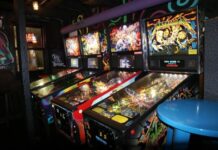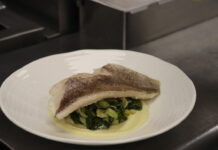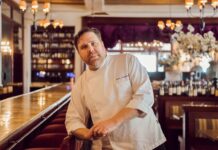Columbia-born Corey Laub’s resume includes Aida Bistro, The Wine Market, Washington, D.C.’s Firefly, Beuchert’s Saloon and Lincoln as well as Chicago’s Novo gastropub. Recently, Laub became executive chef at the Sanchez Gruver Concepts, owners of Fork & Wrench and Modern Cook Shop. He talks about the menu items that make a neighborhood mainstay and how his aspirations switched from politics to cuisine.
Do you plan to make any changes at Fork & Wrench? Fork & Wrench is five years old; we’re trying to revamp it and stay relevant. We want to be the place people can stop in once or twice a week, instead of once a month. So we’re putting a burger on the menu—hopefully the best burger in the neighborhood—and we’re starting a fried chicken night on Mondays. We want to be neighborhood-friendly. The regular menu will remain refined food but very approachable.
What does refined-but-approachable food mean to you? Using good-quality local ingredients and letting them speak for themselves, and to cook everything as well as we can, but not get too crazy. We have a pan-seared rockfish with carrot puree, roasted kale and cauliflower. It’s simple, and the ingredients are filled with flavor. In the fall, we’ll have things like braised short rib—dishes that are more hearty and filling than what we have on the summer menu.
Were your parents early and idealistic residents of Columbia? My parents were there before I was born. They’ve been there for about 35 years. They moved there because they wanted a nice backyard and safe schools. My mom’s a retired teacher, my dad’s an attorney.
When did you decide you wanted to become a chef? I always enjoyed cooking. When I was at Mary Washington College in Fredericksburg, I started working at a sports bar called Home Team Grill. I worked in the kitchen, and from day one, I realized that’s I wanted to do. I dropped out and moved home and worked at Aida Bistro in Columbia.
Were your parents bummed? Yeah, it took them a few years to get onboard with the plan. I was going to be in political science.
So your dad thought you would go to law school and carry on the tradition? Yes, I was leaning in that direction, though I was thinking more of being a politician or a senator. But school wasn’t my thing. I learn a lot better by doing, so working in kitchens, working with my hands is lot better than sitting in the classroom and taking notes.
Why a politician? It has a lot to do with why I got into cooking. I like making people happy, contributing to their quality of life. I love walking out into the dining room, and seeing everyone smiling and knowing that the restaurant contributed to that.
Unhappy people, too? Unfortunately, in this industry, you can’t make everyone happy all the time.
What did you learn at Aida Bistro? A lot of the basics. My chef was Sean Riggs. I started on the salad and dessert station and worked my way up to the pasta station. We’ve kept in touch; he’s a great mentor and friend. After that, I spent some time at The Wine Market in Baltimore. I was there for about six months before moving to D.C.
Did you like Italian at Aida? Aida was Italian in the sense that it’s a lot of fresh pasta, but it’s also American-style local and seasonal. The Wine Market is the same. It’s not a specific regional cuisine.
Do you think you’re young to run two kitchens? I got my first sous chef job at 22. I’ve been pretty young for all the positions I’ve had. But I like to think I’ve never taken a job I’m not confident I can do. It’s important to have a staff I can trust in place to keep the standards up, even if I’m not in the building all the time.
Where did you learn management? Working with Sean at Aida taught me a lot about the business side, how to manage your food costs. At Lincoln in D.C., I learned a lot about how you kind of have to trust people to do what they are supposed to do, but check in to make sure things are going according to plan. Beuchert’s Saloon in Eastern Market had less of a safety net. That taught me a lot about working as hard as you can to get everything done.
Any advice for an aspiring chef? Never dump the braising liquid. When I was at Firefly, we had pot roast on the menu. We’d do a six-hour braise then strain the liquid and reduce it to make a sauce. A few months after I started working there, I went to strain it and poured all the liquid down the sink. The chef had to scramble to make a quick stock. It was good experience to see him think on think on his feet.
It’s also a lesson about waste and to use everything. We try to waste as little as possible. We have a hangar steak on the menu. After the meat is trimmed and portioned, we’ll grind the scraps into our burger meat. When we get in a whole fish, we’ll use the cheeks and collars for a special.
Was there a meal in your past that inspired you to become a chef? One of the first outstanding meals I had was for my friend’s 13th birthday. It was at Pazo. We were in this big private room and it was one of the first real dining experiences I had.
Do you remember what you ate? I remember trying grilled octopus for the first time and paella. I remember calamari that wasn’t breaded and fried. It was my first experience with food being something other than just dinner.





